Presentation to Portfolio Committee on Public Service Regarding Public Service Amendment Bill
The presentation addresses the legal and constitutional issues within the Public Service Amendment Bill, focusing on the insertion of a new clause prohibiting heads of departments from holding political office. It delves into the constitutional framework and limitations of rights, emphasizing the need for a clear separation between politics and administration. Case law references support the argument for harmonious exercise of rights within the context of societal organization.
Download Presentation

Please find below an Image/Link to download the presentation.
The content on the website is provided AS IS for your information and personal use only. It may not be sold, licensed, or shared on other websites without obtaining consent from the author. Download presentation by click this link. If you encounter any issues during the download, it is possible that the publisher has removed the file from their server.
E N D
Presentation Transcript
Presentation to the Portfolio Committee on Public Service RE: THE PUBLIC SERVICE AMENDMENT BILL 1
BACKGROUND The CLSO has considered: The Public Service Amendment Bill, B13-2023 The presentation from the DPSA Written and oral submissions delivered to the Portfolio Committee Case Law The CLSO considered the legal and constitutional issues raised in these submissions and the purpose of this presentation is to address only the legal and constitutional issues Policy issues have been left to the Executive to address. 2
INTRODUCTION I will only address the concerns relating to the constitutional content of the Bill. Clause 16 Insertion of a new clause 36A Limitation of Political Rights Clause 16 seeks to insert section 36A to the Principal Act to prohibit heads of department and employees reporting directly to a head of department from holding an office of authority in a political party. The purpose of the prohibition is to ensure that there is a clear demarcation of politics from the administrative roles and responsibilities. This seeks to eliminate any potential conflict of interest that may arise in so far as it relates to heads of department and employees reporting directly to a head of department. Concern that the provision may not withstand scrutiny 3
RESPONSE Section 36 of the Constitution deals with Limitations of Rights. Section 36(1) states that the rights in the Bill of Rights may be limited only in terms of law of general application to the extent that the limitation is reasonable and justifiable in an open and democratic society based on human dignity, equality and freedom, taking into account all relevant factors, including the nature of the right the importance of the purpose of the limitation; (c) the nature and extent of the limitation; (d) the relation between the limitation and its purpose; and (e) less restrictive means to achieve the purpose. (2) Except as provided for in subsection (1) or any other provision of this Constitution, no law shall limit any right entrenched in the Bill of Rights. 4
Case Law De Reuck v Director of Public Prosecutions (Witwatersrand Local Division) & Others 2002 (6) SA 370 (CC), the court stated: 'I reiterate that the rights contained in the Bill of Rights are not absolute. Rights have to be exercised with due regard and respect for the rights of others. Organised society can only operate on the basis of rights being exercised harmoniously with the rights of others. Of course, the rights exercised by an individual may come into conflict with the rights exercised by another, and where rights come into conflict, a balancing process is required 5
The OCSLA Drafting and certification of legislation is one of the core functions of the OCSLA. The State Law Advisers are tasked with the solemn responsibility of ensuring that the state is able to deliver on its obligations, promote the rule of law and give effect to the values enshrined in the Constitution of the Republic of South Africa. The State Law Advisers scrutinise, develop, draft and certify all primary legislation before it is introduced in the Parliament of the Republic of South Africa. It is the responsibility of the State Law Advisers to ensure that it is compatible with the Constitution and other legal instruments and that it will withstand constitutional muster. 6
CLAUSE 18- AMENDMENT TO SECTION 38 OF THE PRINCIPAL ACT Clause 18 seeks to amend section 38(2)(b)(i), which was declared unconstitutional by the Constitutional Court in the matter of Public Servants Association obo Ubogu v Head of the Department of Health, Gauteng and Others. The Bill makes provision of overpaid salaries to be recovered with the written consent of the employee and where no consent is provided the overpayment may be recovered by way of legal proceedings. In the event that the employee is employed in another department, provision is made for the debt to be recovered by the head of department of the new department. The recovery of overpayments from persons no longer in the employ of the State require legal proceedings or by deduction against any monies owed by the State. 7
RESPONSE Clause 18 proposes to amend section 38(1)(a) of the Public Service Act in order to provide that a head of department (as opposed to the relevant executive authority) shall correct an incorrect salary, salary level, salary scale or reward that was rewarded to an employee. Clause 18 also proposes the amendment of section 38(2)(b)(i), which was required in light of the element of unconstitutionality that section, which was declared unconstitutional by the Constitutional Court in the matter of Public Servants Association obo Ubogu v Head of the Department of Health, Gauteng and Others ( Ubogu matter ), and which resulted in the employer no longer being able to utilise section 38 to unilaterally recover monies that were wrongly paid to its employees, directly from their salary or wages, in the absence of due process or agreement between the parties. 8
The proposed amendment to section 38(2)(b), as captured The proposed amendment to section 38(2)(b), as captured in clause 18 of the Amendment Bill, is as follows: in clause 18 of the Amendment Bill, is as follows: (2) If an employee contemplated in subsection (1) has in respect of his or her salary, including any portion of any allowance or other remuneration or any other benefit calculated on his or her basic salary or salary scale or awarded to him or her by reason of his or her basic salary (a) (b) been overpaid or received any such other benefit not due to him or her 9
(i) an accounting officer may recover such overpayment by way of deduction from the employee s salary with the consent of the employee and, where no consent is provided, if the accounting officer confirms (aa) the amount of the overpayment; (bb) that the employee was afforded an opportunity to make representations regarding the employee s affordability to repay the amount in monthly instalments and such representation was duly considered; (cc) that the amount to be deducted takes into account the nature of the employee s income and current financial obligations; and (dd) that the total deduction is not more than one- quarter of the employee s monthly salary (iA) an accounting officer shall, in the event that the person is no longer in the employ of a department, recover such amount by way of a deduction from any monies owing to such person by the State or by way of legal proceedings; (iB) an accounting officer shall, in the event that the employee is in the employ of another department, request the accounting officer of that other department to recover the overpayment made as contemplated in paragraph (b)(i). (iC) an employee affected by a deduction made in terms of paragraph (b)(i) may appeal against the decision of the accounting officer to the relevant executive authority; and (iD) where an employee lodges an appeal contemplated in paragraph (b)(iC), the deduction contemplated in paragraph (b)(i) may only be given effect to after the relevant executive authority confirms the deduction; and 10
The proposed amendment suggests that the accounting officer may recover the amount of overpayment by way of deduction from the employee s salary with the consent of the employee. However, where the employee does not provide consent, the accounting officer may deduct the amount of overpayment from the employee s salary if the accounting officer confirms the amount of overpayment; that the employee was afforded an opportunity to make representations regarding the employee s affordability to repay the amount in monthly instalments and that such representation was duly considered; that the amount to be deducted takes into account the nature of the employee s income and current financial obligations; and that the total deduction is not more than one quarter of the employee s monthly salary. 11
In terms of the latest proposed amendment of section 38(2)(b) of the Public Service Act, clause 18 of the Amendment Bill proposes, in the proposed new section 38(2)(b)(iC) and (iD), that an employee affected by a deduction in made in terms of section 38(2)(b)(i) may appeal against the decision of the accounting officer to the Minister and that, where an employee lodges such an appeal, the deduction may only be given effect to after the relevant executive authority confirms the deduction. The amendment further provides that, in the event that a person is no longer in the employ of a department, an accounting officer shall such amount by way of a deduction from any monies owing to such person by the State or by way of legal proceedings. Where an employee is in the employee of another department, the accounting officer shall request the accounting officer of that other department to recover the overpayment. 12
In order to ensure that the Bill will pass constitutional muster the OCSLA considered whether the proposed new amendments to section 38(2)(b)(i), as proposed in clause 18 of the Bill, will address the concerns of the Constitutional Court, as set out in the matter of PSA obo Ubogu matter (supra). In the PSA obo Ubogu matter (supra), the Court found, in relation to the current section 38, as follows: [64] Although section 38(2)(b)(i) is a statutory mechanism to ensure recovery of monies wrongly paid to an employee out of the state coffers, the provision gives the state free rein to deduct whatever amounts of money allegedly wrongly paid to an employee without recourse to a court of law. [65]The effect of the provision is to impose strict liability on an employee. The deductions may be made without the employee concerned making representations about her liability and even her ability to pay the instalments. The impugned provision also impermissibly allows an accounting officer unrestrained power to determine, unilaterally, the instalments without an agreement with an employee in terms of which the overpayment may be liquidated. [66] 13
In addition to this, the Court identified that absence of any due process or an agreement between the parties as one of the apparent challenges posed by section 38(2)(b)(i), which lead the Court to hold that the unilateral determination and the resultant deductions of the erroneous payments in terms of that section constitute an unfettered self-help which contravenes the section 1(c) of the Constitution on the rule of law and section 34, which provides for the right of access to courts, and is thus unconstitutional. The reasoning of the Court is that the issue of recovering wrongfully granted remuneration involves two parties, and in the case of a dispute, a third independent and impartial party should arbitrate. If one of the involved parties, in this case the employer, is the one who arbitrates, then that party becomes the player and the referee in its own case. Section 38(2)(b)(i) undermines a deeper principle underlying our democratic order. The deductions in terms of that provision constitute an unfettered self-help the taking of the law by the state into its own hands and enabling it to become the judge in its own cause, in violation of section 1(c) of the Constitution. The impugned provision allows the state to undermine judicial process which requires disputes be resolved by law as envisaged in section 34 of the Constitution. The mechanism through section 38(2)(b)(i), as currently formulated, is clearly unfair. It promotes self-help and imposes strict liability on an employee in respect of overpayment irrespective of whether the employee can afford the arbitrarily determined instalments and was afforded an opportunity for legal redress. It is evident from the Court s findings in the PSA obo Ubogu matter that the main issue with section 38(2)(b)(i) of the Public Service Act was that it allowed for the unilateral determination by a State department of whether there was overpayment and, if so, how the amount overpaid should be recovered, even where the relevant employee disputes the indebtedness. 14
The difficulty that we are faced with the proposed amendment of section 38(2)(b)(i), as contained in clause 18 of the Amendment Bill, is that failing consent, the accounting officer is still the judge in its own cause, in violation of section 1(c) of the Constitution , as indicated by the Court in the PSA obo Ubogu matter, in that the accounting officer still determines the amount of overpayment and also considers, in terms of the proposed new section 38(2)(b)(i)(bb) and (cc), the employee s representations and the extent the employee s representations have an impact on the deductions. Furthermore, there still appears to be an unjustified differentiation between employees who are still employed by the State and those who are no longer so employed, in that amounts overpaid by a department are recovered by way of legal proceedings from those who are no longer employed by the State, whilst recovery through legal proceedings is not afforded to those who are still employed by the State. 15
In light of the above, and in an attempt to assist the Department to amend section 38(2)(b)(i) of the Public Service Act in a manner that would pass constitutional muster, the OCSLA proposed that paragraph (b) of clause 18 of the Amendment Bill be redrafted, which culminated in the below: (b) by the substitution in subsection (2) for paragraph (b) of the following paragraph: (b) been overpaid or received any such other benefit not due to him or her (i) an accounting officer may recover such overpayment by way of deduction from the employee s salary with the consent, in writing, of the employee and, where no consent is provided, recover such amount of overpayment from the employee by way of legal proceedings. (iA) an accounting officer shall, in the event that the person is no longer in the employ of a department, recover such amount by way of a deduction from any monies owing to such person by the State, with the consent of such employee, or by way of legal proceedings; 16
(iB) an accounting officer shall, in the event that the employee is in the employ of another department, request the accounting officer of that other department to recover the overpayment made in the manner contemplated in paragraph (b)(i). (iC) an employee affected by a deduction made in terms of paragraph (b)(i) may appeal against the decision of the accounting officer to the relevant executive authority; and (iD) where an employee lodges an appeal contemplated in paragraph (b)(iC), the deduction contemplated in paragraph (b)(i) may only be given effect to after the relevant executive authority confirms the deduction; and . (ii)that other benefit shall be discontinued or withdrawn as from a current date, but the employee concerned shall have the right to be compensated by the State for any patrimonial loss which he or she has suffered or will suffer as a result of that discontinuation or withdrawal. . In our view, this appears to be the only option that would result in the amendment of section 38(2)(b)(i) passing constitutional muster. We kindly request the Department to consider our proposed amendment. 17
There is no legal impediment with the manner in which section 38 is currently crafted. It is legally sound and is constitutionally compliant. However, in attempt to assist the committee further the OCSLA and Parliamentary Legal Adviser have deliberated on the matter and the OCSLA has re-crafted the clause. OCSLA s PROPOSED AMENDED CLAUSE 18(b) of PUBLIC SERVICE AMENDMENT BILL, [B13-2023] (b) by the substitution in subsection (2) for paragraph (b) of the following paragraph: (b) been overpaid or received any such other benefit not due to him or her (i) an accounting officer may recover such overpayment by way of deduction from the employee s salary if the accounting officer and employee agree, in writing (aa) on the amount of the overpayment; (bb) on a reasonable period for the repayment of the amount of overpayment; and (cc) on the amount to be deducted from the employee s salary, either in full or in monthly instalments, taking into consideration the employee s income and current financial obligations: Provided that the total deduction is not more than one-quarter of the employee s monthly salary; or 18
(ii) contemplated in subparagraph (i), recover such amount of overpayment by way of legal proceedings; (iii) an accounting officer shall, in the event that the person is no longer in the employ of a department, recover such amount by way of a deduction from any monies owing to such person by the State or by way of legal proceedings; . (iv) an accounting officer shall, in the event that the employee is in the employ of another department, request the accounting officer of that other department to recover, in the manner contemplated in subparagraph (i) or (ii), the overpayment made; or (v) that other benefit shall be discontinued or withdrawn as from a current date, but the employee concerned shall have the right to be compensated by the State for any patrimonial loss, which he or she has suffered as a result of that discontinuation or withdrawal. an accounting officer may, in the absence of agreement as 19
THE END 20
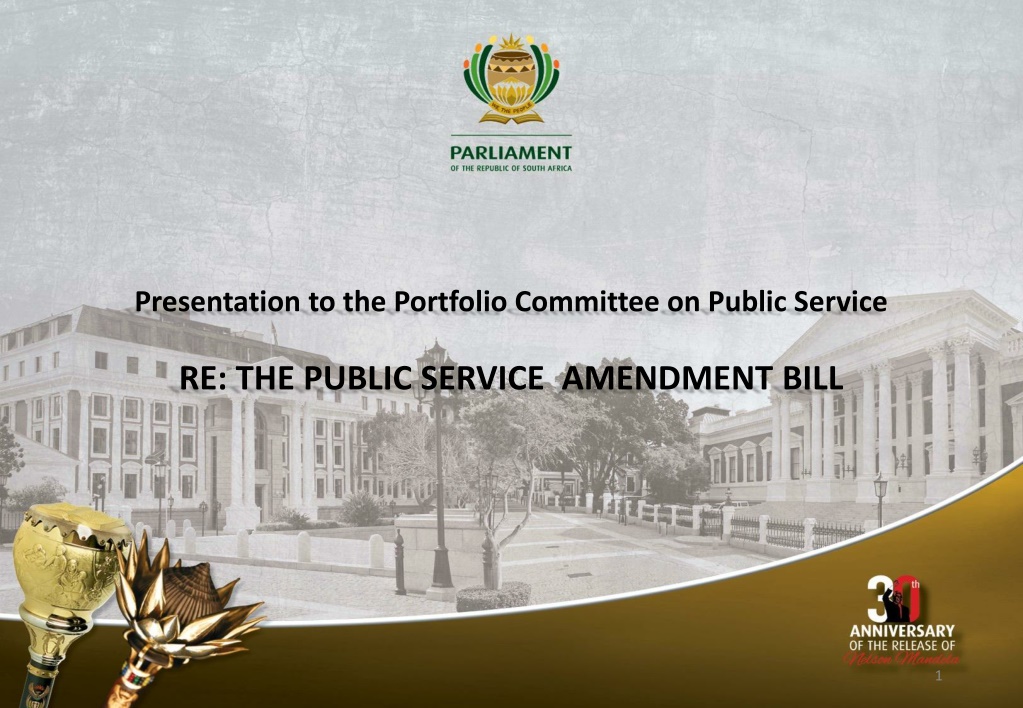

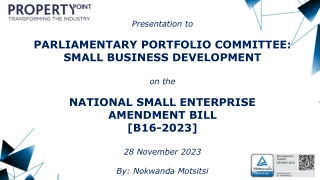
![RE: ELECTORAL MATTERS AMENDMENT BILL [ B42-2023]](/thumb/18837/re-electoral-matters-amendment-bill-b42-2023.jpg)

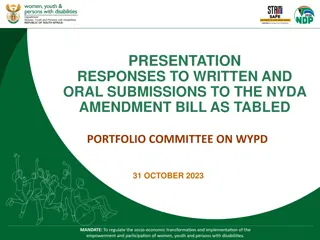
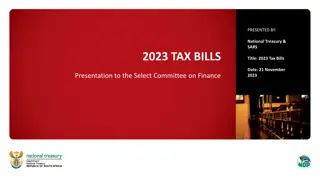
![Enhancing Corporate Transparency: Analysing The Companies Amendment Bill [B27B-2023]](/thumb/60028/enhancing-corporate-transparency-analysing-the-companies-amendment-bill-b27b-2023.jpg)
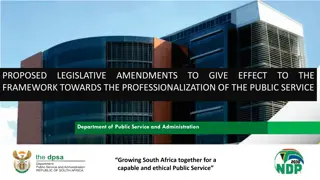
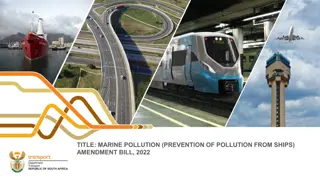
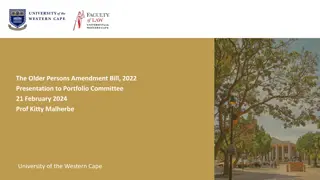
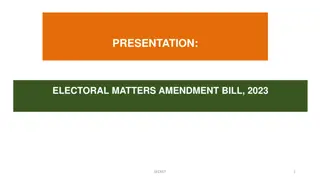

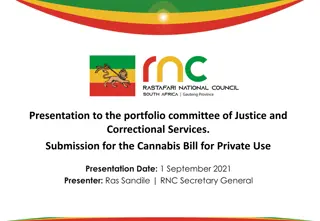
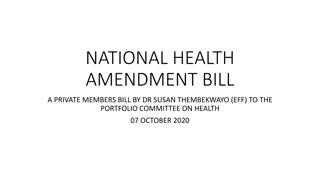

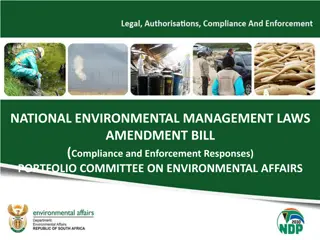
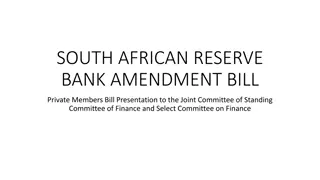

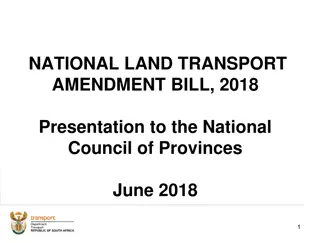
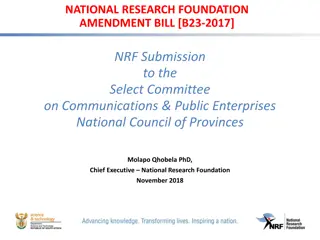
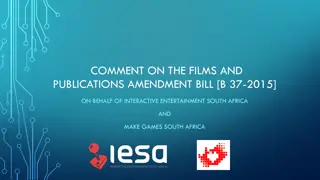
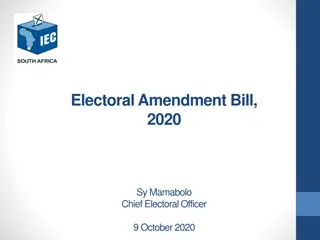
![Briefing on the Criminal Procedure Amendment Bill [B12-2021] to the Portfolio Committee on Justice and Correctional Services](/thumb/157093/briefing-on-the-criminal-procedure-amendment-bill-b12-2021-to-the-portfolio-committee-on-justice-and-correctional-services.jpg)